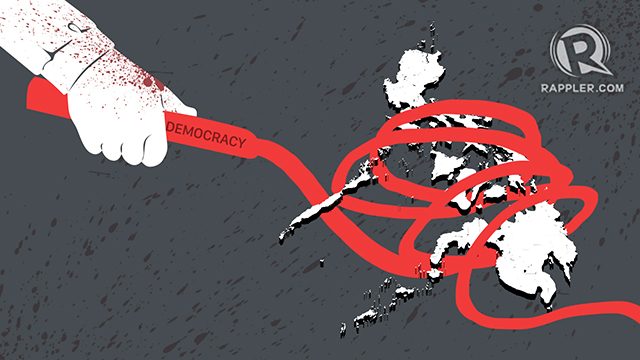SUMMARY
This is AI generated summarization, which may have errors. For context, always refer to the full article.
![[Newspoint] A pathological democracy](https://www.rappler.com/tachyon/r3-assets/612F469A6EA84F6BAE882D2B94A4B421/img/D50E797189D44466921883A2E35102A0/vergel-santos-headshot-150px.jpg)
The week has seen the two latest cases of deviancy in the Duterte government.
One, its press office has decided to accredit bloggers to cover the President, thus equating them with journalists.
Two, President Duterte has pinned a medal on a police official, thus equating him with heroes, for his lead role in the war against drugs, which has accounted for thousands of deaths, many of them suspected as summary executions – EJK, for “extrajudicial killings,” in the lingo of the times.
When the communications secretary first raised the idea of legitimizing bloggers some months ago, I commented on it in a piece titled “A runaway train,” published here on February 3, 2017, and updated on April 19, 2017. I’m now reproducing some parts of it to support a larger point – consistent official deviancy:
“Accrediting bloggers would encourage a blurring of the distinction between legitimate journalism and pseudo-journalism, of which blogging happens to be today’s most typical example; the confusion necessarily extends to the audiences, and that’s where the disservice and the danger lie.
“Blogging is an individualistic, free-wheeling operation – although some bloggers are known to follow a common, if not collusive, line of thinking. It’s the readiest, least-discriminating (in fact, it’s open to anyone), widest-reaching, and therefore most tempting platform of free expression. It is cheap, and [it is] easy enough for one to equip oneself for it, and, once suitably equipped, one has the whole wired world for one’s potential audience.
“Journalism, on the other hand, is an organized enterprise, both a profession and a trade, governed by universal rules of practice and ethics and tradition. Journalists are trained in certain disciplines and skills; yet, their practice remains subject to layer upon layer of checks, and they are made to assume their share of individual as well as collective responsibility.
“Journalism is an engineered [I mean professionally piloted] train; blogging is a runaway one.”
The other case illustrates an even sicker twisting of standards. A Japanese word comes to mind: gyakuho, literally meaning “reverse way”; it was used in the moral sense when I encountered it. Our own gyakuho case involves Jovie Espenido.

Espenido has been suspected in the killing of two mayors accused of illegal-drug trading. The suspicion is drawn not only from his parroting of Duterte’s “kill ‘em” rhetoric but from his place in the scheme of things: he was the chief enforcer of the antidrug campaign in the places where the mayors operated and fell dead in his wake.
That campaign is itself pursued on a deviant concept of law and order, which prefers elimination over rehabilitation, which assures protection – and even reward, as in Espenido’s case – for the police, not for the suspects, not even for the public. Precisely for this reversal of moral principles, the public is left in terror of the police.
To whom now, for instance, do the orphans of Michael and Christopher Marasigan turn? The brothers were waylaid last week by two men in the fashion adopted by the police themselves – riding together on a motorcycle, their identities concealed. If Michael, a former newspaper editor and until his death a press agent for the finance secretary, a man of fine reputation all in all, could be so brutally slain – 34 bullet casings were found at the scene – what chances do other people have?
Deviancy in fact characterizes the policies and workings of the Duterte government: it chooses, for instance, to make war in order to achieve peace – funereal peace, I can only imagine – as in Marawi, among other theaters of conflict; it also prefers to capitulate to Chinese intruders rather than assert the nation’s self-respect and sovereignty over parts of the South China Sea judged by international arbitration as Philippine territory; the president himself “heils” Adolf Hitler and professes to idolize Hitler’s Filipino counterpart – Ferdinand Marcos – and even got the Supreme Court to allow Marcos to be buried a hero.
Indeed, deviancy defines the character of Rodrigo Duterte. Clinical findings solid enough to be admitted into the court records pronounce him: “antisocial, narcissistic”; exhibiting “gross indifference, insensitivity and self-centeredness…[and a] grandiose sense of self-entitlement and manipulative behaviors.”
If Duterte’s communications secretary and his generals and police officials put up or go along with all his flouting of the universal norms of decency, civility, and morality, if what the polls show is true – that more than 80% approve of the way he is running the country – and if we insist we are a democracy, then we must be a pathological one. – Rappler.com
Add a comment
How does this make you feel?
There are no comments yet. Add your comment to start the conversation.